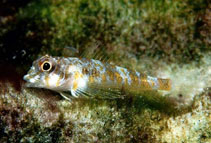| Family: |
Tripterygiidae (Triplefin blennies), subfamily: Tripterygiinae |
| Max. size: |
3.5 cm TL (male/unsexed) |
| Environment: |
demersal; marine; depth range 7 - 8 m |
| Distribution: |
Eastern Central Pacific: Isla del Coco. A very similar but possibly undescribed species from the Revillagigedo Islands. |
| Diagnosis: |
Dorsal spines (total): 16-16; Dorsal soft rays (total): 9-9; Anal spines: 2-2; Anal soft rays: 18-18. Lateral line gradually descending from upper edge of gill cover to midlateral axis; lateral line with 21-26 tubed scales followed by 8-12 notched scales; total scales in longitudinal series 33-35; a small lanceolate cirrus on upper edge of eye. Head pink to reddish; side with 3 broad, dark brown bars with narrow, whitish spaces between them; a black band around base of caudal fin; caudal fin frequently black (Ref. 11482). |
| Biology: |
Adults inhabit shallow rocky areas. They feed on tiny invertebrates and algae (Ref. 11482). Eggs are hemispherical and covered with numerous sticky threads that anchor them in the algae on the nesting sites (Ref. 240). Larvae are planktonic which occur primarily in shallow, nearshore waters (Ref. 94114). |
| IUCN Red List Status: |
Vulnerable (VU); Date assessed: 27 May 2007 (D2) Ref. (130435)
|
| Threat to humans: |
harmless |
Source and more info: www.fishbase.org. For personal, classroom, and other internal use only. Not for publication.
